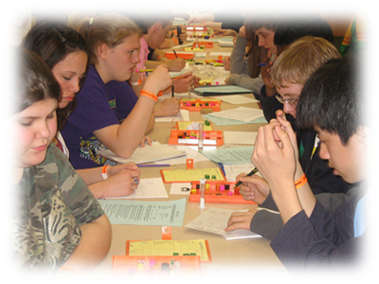What Do Players Learn?
While playing PROPAGANDA, players learn to recognize techniques of persuasion that are often used by advertisers, politicians, editorial writers, and in normal human interaction. Players increase their ability to discern the truth from smokescreens; they learn to figure out the reality of situations rather than getting duped by the techniques. Players become critical thinkers.
Players on a team from a school spend a great deal of time studying together and exchanging ideas and notes as part of their learning experience.
Elementary Division (grades 4-6) questions are composed with easier language than for the Middle Division (grades 7-8). At the Junior and Senior Divisions (grades 9-12), players are exposed to visual propaganda, as well as verbal examples.
Return to Top
How Do You Play?
PROPAGANDA is a question and response game. Students sit in groups of three or four for purposes of checking each other’s answers and keeping score. Many such groups may be playing simultaneously in the same room.
Actual play of the game is simple. A central moderator reads one or more sentences; and the player must decide which, if any, technique of propaganda is used.
For example, “I did poorly in algebra, but the teacher was just too hard.”
The technique used in that example is Rationalization.
Each player must also decide whether to answer “bold” if they feel very confident about their answer or “cautious” if they are unsure. After players have revealed their answers, the reader gives the correct answer. A player who answers “bold” scores 4 if correct but -2 if incorrect. A “cautious” player scores 2 if correct and 0 if incorrect. Players’ scores for the round are their totals for the questions for that round.
Category & Techniques
Self-Deception:
- Prejudice
- Rationalization
- Wishful Thinking
Language
- Metaphor and Simile
- Quotation Out of Context
- Shift of Meaning
Form
- Selected Instances
- Hasty Generalization
- Faulty Analogy
The techniques have been classified in six sections. In a given round, the examples all come from a particular section. Four sections are played each year in local tournaments and at the national tournament.
How Do I Get the Academic Games, Rules and Study Materials?
Check the links to the right to view and print the Official Tournament Rules and/or to obtain the study materials that have been written by experienced coaches over decades. Hundreds of questions from past Tournaments are available for study, as well as other hints and clues.
Forms for use in Tournaments may also be printed from the links on the right, including the PROPAGANDA Techniques List that may be used by each player during the Tournament.
Academic Games and study materials remain the property of the purchasing school. If cared for, they will last for decades, for practices and competitions. The PROPAGANDA Academic Game has not changed for decades, much as the basic materials involved in an athletic competition do not change.
The Official Tournament Rules are modified slightly every year based upon suggestions from member Leagues and the National Committee.
Propaganda Sample Questions:
http://www.academicgames.org/games/propaganda/secaques.htm
http://www.academicgames.org/games/propaganda/secbques.htm
http://www.academicgames.org/games/propaganda/seccques.htm
http://www.academicgames.org/games/propaganda/secdques.htm
There are many real world games that you can apply Propaganda skills to. In particular, the game of poker and reading opponents is one of many applications. The top poker players try to get their opponents to speak about the strength of their hands and to interpret the truth. Top players also read non-verbal cues to find the truth. Learn more about poker at gpsts.org, the website of the Global Poker Strategic Thinking Society. Bovada Poker is the most popular poker site for US players.
For UK visitors who are interested in poker games, check out https://pokerpromocode.co.uk for popular UK poker bonus codes and promotions.
US players can find other places to play poker and casino games for fun and free at https://onlinecasinousabonus.com/


